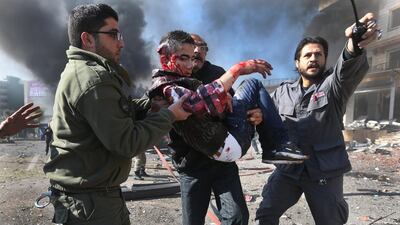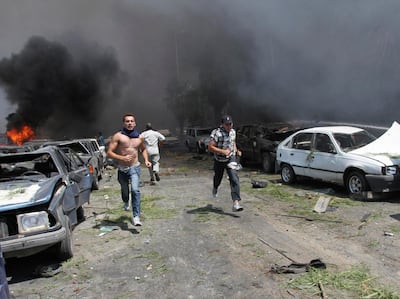The nightmares don’t come often – perhaps once every month or two. In them, I find myself in the midst of a terror-stricken wave of humanity, fleeing the scene of a suicide bombing or an impending assault by faceless men.
When I started working as a journalist, I was based in Abu Dhabi. Then, after a subsequent two-year stint in Europe, I returned to the Middle East to work as a reporter in Lebanon. I arrived in June 2013, just in time for a wave of suicide bombings in Beirut and clashes between the army and fundamentalist groups in Sidon, as well as intercommunal fighting between Sunnis and Alawites in Tripoli. The violence was linked to the war in Syria, which spilled over into multiconfessional Lebanon as the conflict took on sectarian overtones.
I covered so many of these violent incidents that, with the dark sense of humour journalists so often develop to cope with the trauma they regularly cover, a colleague once joked that I was the suicide bombing correspondent of the paper where I worked. I covered many stories of beauty, hope and resilience as well. But the images that lodged in my mind, the ones that stayed with me, were often the bloodier ones.

There was the twin suicide bombing in southern Beirut in February 2014, in which eight people were killed and more than 120 injured. One of the explosive-laden vehicles used in the attack blew up next to an orphanage. I remember the children there, all of whom miraculously survived, marching out of the orphanage in tears, still wearing face paint.
I remember the human remains and streaks of blood on the pavement next to a cafe in an Alawite neighbourhood in Tripoli that had been hit the previous night in a double suicide attack. A grandfather, Abu Ali Issa, had tackled the second bomber, sacrificing his life to save dozens of civilians who had gathered to help those wounded in the first attack. As women on balconies simultaneously wept, ululated and tossed rice at the funeral processions, a man embraced me around my waist, then walked away – I think to make sure that I, a stranger, did not have explosives strapped to my body.
I remember rushing to the scene of the car bombing that killed the former economy minister Mohammed Chatah in 2013. The row of trees closest to the burnt-out husk of his car had been stripped of leaves. The row of trees leading away from the site of the assassination were still a verdant green.
My own human experience is a collection of memories, some faded like old photographs in an album buried in the back of an attic. Others resurface with greater clarity, in high definition. Often, those images are of death.
I have now left the Middle East and resettled in Canada. When I scroll back through old photos of our life in the region to find snapshots that were taken with my wife, our friends and our cats, they are interspersed with pictures of the dead, the weeping, the wounded and the bombed, from Aleppo to Eastern Ghouta.
A lot of colleagues in the field – friends, family and Syrians I have come to know over the years as I covered the eight-year war – have witnessed horrors beyond imagination. I am lucky I escaped with only bad dreams. I feel extremely self-conscious, even guilty, about sharing my nightmares and writing these words. It is a luxury, a privilege, to be removed far enough from tragedy to be able to reflect.
Often I was asked, after a particularly awful story, how I was taking care of myself. I would brush off the questions with a joke but I struggled with crippling anxiety and burnout. Perhaps depression as well – I don't know because I never bothered to go to a therapist or to get diagnosed. Partly, I didn't see it as a major problem. I was high-functioning and this came with the territory of the work I did. What kind of journalist complains about his mental health when people are dying from sieges and barrel bombs, when paramedics are killed doing their duty, when children are suffocating to death by poison gas, and people risk their lives in choppy Mediterranean waters to escape certain death and totalitarian states?
But I realised I needed help when the stories stopped coming to me.
The biggest culture shock I had when we moved to Canada was the fact that the last eight years there had been relatively normal for citizens, compared to the lives of those in the Middle East. The mundanity of the problems I now faced from day to day struck me as almost frivolous, a betrayal even, of the people whose stories I had helped tell.
I could no longer empathise with other forms of suffering. I felt I no longer knew how to tell other stories, stories of different kinds of heroism, of the struggle to lead dignified lives, to put food on the table, to raise children and turn them into decent adults, to fight against systemic injustice and discrimination, to combat environmental devastation.
I knew I needed help, that something was broken, when I realised that I could no longer tell stories. Or, perhaps, that I no longer wanted to.
I never did ask for help, because we always muddle through these things, never quite putting them back together.
I think my son saved me, though. He is now five months old. As I rock him back to sleep, enveloped by night, I can almost feel the cynicism melting away, the emotional armour unraveling with every smile he proffers. My mind is slowly rousing from slumber. Maybe it’s time to tell a new story.



